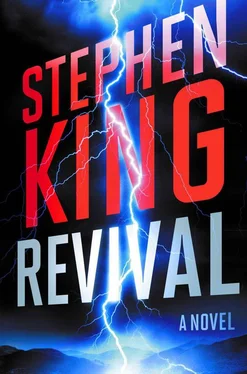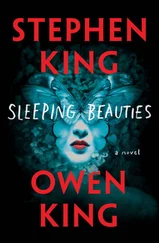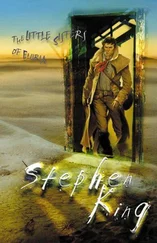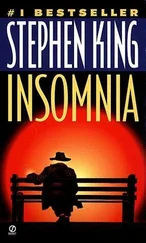“To Skytop,” I said.
He smiled his lopsided smile. “Go now. I need to keep an eye on these storms. They’re producing over a hundred lightning-strikes an hour in the Albany area, isn’t that wonderful?”
Not the word I would have chosen. I couldn’t remember how many volts he’d said a single lightning-strike produced, but I knew it was a lot.
In the millions.
• • •
Charlie’s call-bell went off againa little after 5 PM. I went upstairs, part of me hoping to see him downhearted and angry, another part as damnably curious as ever. I thought that was the part that would be satisfied, because the day was darkening rapidly in the west, and I could already hear mumbles of thunder, distant but approaching. An army in the sky.
Jacobs was still listing to starboard, but excitement—he was fairly bursting with it—made him look years younger. His mahogany box was on the end table. He had shut off the TV in favor of his laptop. “Look at this, Jamie! It’s beautiful!”
The screen displayed NOAA’s projection of the evening’s weather. It showed a tightening cone of orange and red that went directly over Castle County. The timeline projected the highest probability of heavy weather arriving between seven and eight. I glanced at my watch and saw it was five fifteen.
“Isn’t it? Isn’t it beautiful?”
“If you say so, Charlie.”
“Sit down, but get me a glass of water first, if you will. I have some explaining to do, and I think there’s just time. Although we’ll want to go soon, yes we will. In carny terminology, we’ll want to DS.” He cackled.
I got a bottle of water from the bar refrigerator and poured it into a Waterford glass—nothing but the best for guests of the Cooper Suite. He sipped and popped his lips in appreciation, a leathery smack I could have done without. Thunder rumbled. He looked toward the sound, his smile that of a man anticipating the arrival of an old friend. Then he turned his attention back to me.
“I made a great deal of money playing Pastor Danny, as you know. But instead of spending it on private jets, heated doghouses, and gold-plated bathroom fixtures, I spent mine on two things. One was privacy—I’ve had enough of Jesus-shouting pagans to last me a lifetime. The other was private investigation firms, a dozen in all, the best of the best, located in a dozen major American cities. I tasked them with finding and tracking certain people suffering from certain diseases. Comparative rarities. Eight such illnesses in all.”
“ Sick people? Not your cures? Because that’s what you told me.”
“Oh, they tracked a representative number of cures, too—you weren’t the only one interested in aftereffects, Jamie—but that wasn’t their main job. Starting ten years ago, they found several hundred of these unfortunate sufferers, and sent me regular updates. Al Stamper minded the dossiers until he left my employ; since then, I’ve done it myself. Many of those unlucky people have since died; others replaced them. Man is born to illness and sorrow, as you know.”
I didn’t answer, but the thunder did. The sky in the west was now dark with bad intentions.
“As my studies progressed—”
“Was a book called De Vermis Mysteriis part of your studies, Charlie?”
He looked startled, then relaxed. “Good for you. De Vermis wasn’t just a part of my studies, it was the basis of them. Prinn went mad, you know. He ended his days in a German castle, studying abstruse mathematics and eating bugs. Grew his fingernails long, tore out his throat with them one night, and died at the age of thirty-seven, painting equations on the floor of his room in blood.”
“Really?”
He gave the one-sided shrug, accompanied by the one-sided grin. “Who knows for sure? A cautionary tale if true, but the histories of such visionaries were written by people interested in making sure no one else followed their paths. Religious types, for the most part, overseers of the Heavenly Insurance Company. But never mind that now; we’ll speak of Prinn another day.”
I doubt it , I thought.
“As my studies progressed, my investigators began a winnowing process. Hundreds became dozens. Early this year, dozens became ten. In June, the ten became three.” He leaned forward. “I was looking for the one I’ve always thought of as Patient Omega.”
“Your last cure.”
This seemed to amuse him. “You could say so. Yes, why not? Which brings us to the sad story of Mary Fay, which I just have time to tell before we remove to my workshop.” He gave a hoarse laugh that reminded me of Astrid’s voice before he’d cured her. “Workshop Omega, I suppose. Only this one is also a well-equipped hospital suite.”
“Run by Nurse Jenny.”
“What a find she was, Jamie! Rudy Kelly would have been at a loss… or have gone yipping down the road like a puppy with a wasp in his ear.”
“Tell me the story,” I said. “Let me know what I’m getting into.”
He settled back. “Once upon a time, in the seventies, a man named Franklin Fay married a woman named Janice Shelley. They were graduate students in the English Department at Columbia University, and went on to teach together. Franklin was a published poet—I’ve read his work and it’s quite good. Given more time, he might have been one of the great ones. His wife wrote her dissertation on James Joyce and taught English and Irish literature. In 1980, they had a daughter.”
“Mary.”
“Yes. In 1983 they were offered teaching positions at American College in Dublin, as part of a two-year exchange program. With me so far?”
“Yes.”
“In the summer of 1985, while you were playing music and I was working the carny circuit with my Portraits in Lightning gaff, the Fays decided to tour Ireland before returning to the States. They rented a camper—what our British and Irish cousins call a caravan—and set out. They stopped one day for a pub lunch in County Offaly. Shortly after they left, they collided head-on with a produce truck. Mr. and Mrs. Fay were killed. The child, riding behind them and strapped in, was badly injured but survived.”
It was an almost exact replay of the accident that had killed his wife and son. I thought then that he must have known it, but now I’m not so sure. Sometimes we’re just too close.
“They were driving on the wrong side of the road, you see. My theory is that Franklin had a beer or glass of wine too many, forgot he was in Ireland, and reverted to his old habit of driving on the right. The same thing may have happened to an American actor, I think, although I don’t recall the name.”
I did, but didn’t bother to tell him.
“In the hospital, young Mary Fay was given a number of blood transfusions. Do you see where this is going?” And when I shook my head: “The blood was tainted, Jamie. By the infectious prion that causes Creutzfeldt-Jakob, commonly called mad cow disease.”
More thunder. Now a boom instead of a mumble.
“Mary was raised by an aunt and uncle. She did well in school, became a legal secretary, went back to college to get a law degree, quit the program after two semesters, and eventually resumed her former secretarial duties. This was in 2007. The disease she was carrying was dormant, and remained so until last summer. Then she began suffering symptoms that are normally associated with drug use, a mental breakdown, or both. She quit her job. Money was in short supply, and by October of 2013, she was also suffering physical symptoms: myoclonus, ataxia, seizures. The prion was fully awake and hard at work, eating holes in her brain. A spinal tap and MRI finally revealed the culprit.”
“Jesus,” I said. Old news footage, probably watched in some motel room or other while I was on the road, began playing behind my eyes: a cow in a muddy stall, legs splayed, head cocked, eyes rolling, mooing mindlessly as it tried to find its feet.
Читать дальше












